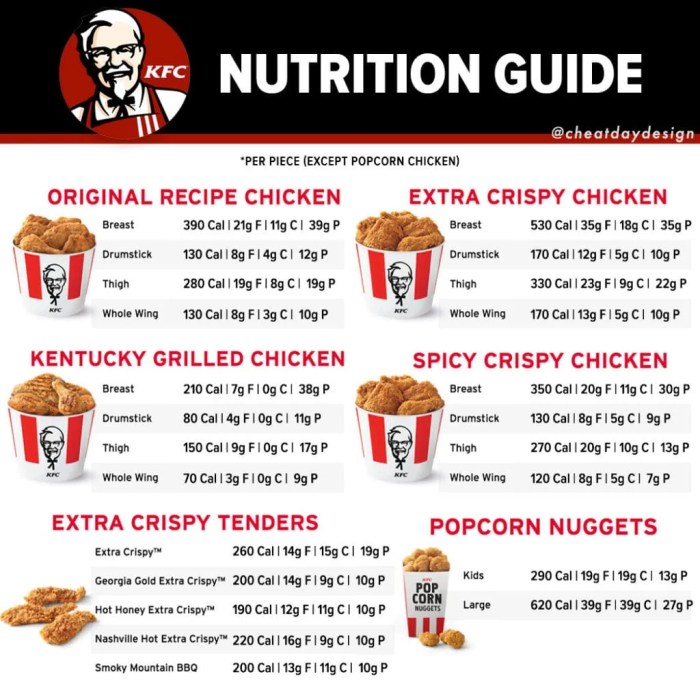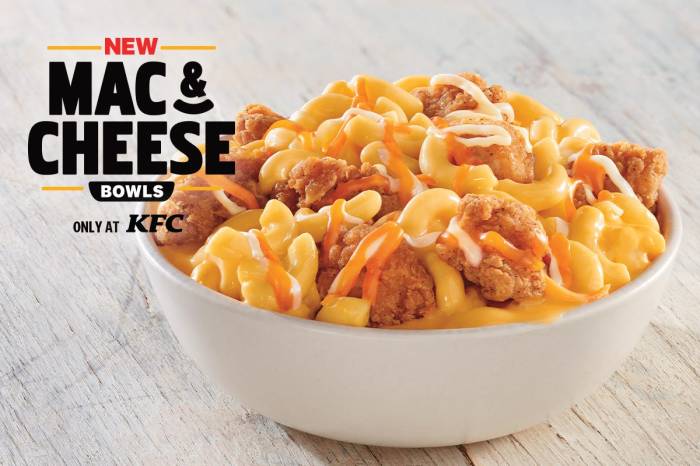Nutritional Information per Serving Size

KFC macaroni and cheese nutritional content varies depending on the serving size offered. Accurate and up-to-date nutritional information should always be sought directly from KFC’s official website or packaging, as values can change. The following data represents an approximation based on available information and should be considered an estimate. Individual values may differ slightly.
Macaroni and Cheese Nutritional Content by Serving Size
The table below provides estimated nutritional information for various serving sizes of KFC macaroni and cheese. Note that these are approximations, and actual values may vary. Always refer to the most current information provided by KFC for the most accurate details.
| Nutrient | Small Serving (Approximate) | Medium Serving (Approximate) | Large Serving (Approximate) |
|---|---|---|---|
| Calories | 250 | 400 | 600 |
| Total Fat (g) | 12 | 20 | 30 |
| Saturated Fat (g) | 6 | 10 | 15 |
| Cholesterol (mg) | 20 | 30 | 45 |
| Sodium (mg) | 600 | 950 | 1400 |
| Total Carbohydrate (g) | 30 | 50 | 75 |
| Dietary Fiber (g) | 1 | 2 | 3 |
| Sugars (g) | 5 | 8 | 12 |
| Protein (g) | 8 | 13 | 20 |
| % Daily Value (DV) will vary significantly depending on individual daily caloric needs and may not be accurately represented with estimated values. Consult a nutritionist or dietician for personalized dietary guidance. |
Serving Size Considerations
Understanding that serving sizes directly impact nutritional intake is crucial. A smaller serving of KFC macaroni and cheese will naturally contain fewer calories and less fat, sodium, and other nutrients compared to a larger serving. Consumers should be mindful of portion control to manage their calorie and nutrient intake effectively. For example, choosing a small serving instead of a large one can significantly reduce the overall caloric and fat consumption.
Yo, so you’re tryna check the KFC mac and cheese nutrition? That creamy goodness hits different, but let’s be real, it’s heavy on the calories. For a comparison, check out the nutrition facts for bagel with cream cheese – it might surprise you how those bagels stack up. Anyway, back to that KFC mac and cheese – portion control is your best friend, fam.
Impact on Overall Diet and Health: Kfc Macaroni And Cheese Nutrition

Regular consumption of KFC macaroni and cheese, like any high-calorie, high-fat, and high-sodium food, can significantly impact overall health and well-being if not incorporated thoughtfully into a balanced diet. Its high caloric density contributes to weight gain, while the saturated and trans fats increase the risk of cardiovascular diseases. The high sodium content can elevate blood pressure, further increasing the risk of heart disease and stroke.
Understanding these potential negative effects is crucial for responsible consumption.The high levels of saturated fat, sodium, and refined carbohydrates in KFC macaroni and cheese make it a nutritionally less-dense food choice compared to alternatives like whole-grain pasta with lean protein and vegetables. Consuming this dish frequently can displace opportunities to include nutrient-rich foods essential for maintaining optimal health.
This displacement can lead to deficiencies in vitamins, minerals, and fiber, ultimately affecting various bodily functions and increasing the risk of chronic diseases.
Portion Control and Frequency Recommendations
Incorporating KFC macaroni and cheese into a balanced diet requires careful consideration of portion size and consumption frequency. A single serving should be viewed as an occasional treat rather than a regular part of the diet. For example, limiting consumption to once a month, or even less frequently, can help minimize the negative health consequences associated with its high calorie and fat content.
Pairing it with a larger portion of vegetables or a salad can help balance the meal’s nutritional profile, although this will not fully negate the inherent nutritional drawbacks. Mindful eating and portion control are key to reducing the impact of this food on overall health.
Long-Term Health Consequences of Frequent Consumption, Kfc macaroni and cheese nutrition
Frequent consumption of KFC macaroni and cheese significantly increases the risk of developing several chronic health problems. Obesity, a major risk factor for type 2 diabetes, heart disease, and certain types of cancer, is directly linked to a diet high in calories and unhealthy fats, like those found in this dish. The high sodium content contributes to hypertension, which further elevates the risk of cardiovascular events such as stroke and heart attack.
Furthermore, the lack of fiber and essential micronutrients can lead to digestive issues and nutritional deficiencies over time. For instance, a person consistently consuming large portions of this dish might experience weight gain, increased blood pressure, and elevated cholesterol levels, putting them at a higher risk for long-term health problems.
Mitigating Negative Health Effects
To mitigate the negative health effects of consuming KFC macaroni and cheese, several strategies can be employed. Choosing smaller portion sizes is a crucial first step. Pairing the dish with nutrient-rich foods, such as a large green salad or a serving of steamed vegetables, can help balance the meal’s overall nutritional value. Regular physical activity helps burn calories and maintain a healthy weight, offsetting some of the caloric impact of this high-calorie food.
Finally, maintaining a balanced diet that prioritizes whole grains, fruits, vegetables, and lean proteins for the majority of meals is essential to minimize the negative health effects of occasional consumption of less-nutritious foods. Making informed choices about food intake and incorporating regular exercise are critical to overall health and well-being.
Top FAQs
Is KFC macaroni and cheese vegetarian?
While KFC doesn’t explicitly state it’s vegetarian, it typically contains dairy and may contain other non-vegetarian ingredients depending on preparation methods and potential cross-contamination. It’s not suitable for vegans.
How much sodium is in a serving of KFC macaroni and cheese?
The sodium content varies depending on serving size. Checking the nutritional information panel on the KFC website or packaging is recommended for the most accurate data.
Can I microwave KFC macaroni and cheese?
Yes, but follow the instructions provided on the packaging for optimal results and food safety. Heating times may vary depending on your microwave’s wattage.
Does KFC offer a lower-calorie macaroni and cheese option?
Currently, KFC does not offer a specifically lower-calorie version of their macaroni and cheese. Portion control is the best way to reduce calorie intake.


